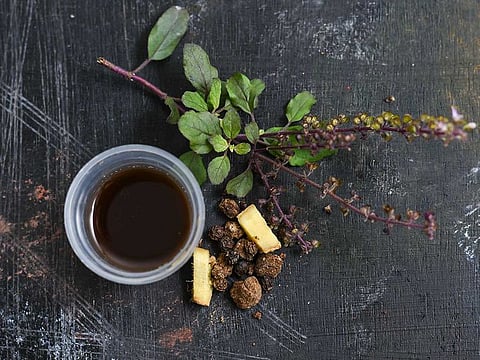Fake news is sometimes fun
Most of us realise these coronavirus health tips are nothing more than scam news

Also In This Package
“Go on, drink it up!” I looked in horror at the green muck, a concoction of various leaves and vegetables. My better half, who is something of a health freak, had blended this ugly-looking brew that someone had sent him over Whatsapp as an immunity booster, and indirectly, a preventive of the dreaded coronavirus.
This, and many similar recipes, arrive in our inbox every day, as I am sure they do in yours. The recipes and tips claim to prevent catching the virus, while the more daring ones state they are a cure in case you are one of the unlucky ones who’ve caught it.
Turmeric, the spice used in many Indian and Asian cuisines, is among the more popular immunity boosters. Another ‘preventive’ advises you to mix bicarbonate of soda and half a lemon in a glass of lukewarm water. Yet another tip suggests you keep your throat constantly moist by sipping water every 15 minutes, or to gargle with salt water ten times a day.
Most of these health tips are harmless, and based on granny’s household remedies. The better ones are quite appetising, like rasam or ginger-lemon-honey water...
One of the more interesting suggestions is to drink plenty of ‘rasam.’ Rasam is a popular soup in South India, made of lentils and tomatoes and spiced up with a ‘rasam mix.” It is delicious on its own or mixed with rice. But rasam having a preventive effect on coronavirus is like telling a person with cancer to take a paracetamol. Eating 15 pods of raw garlic is also touted as a sure-fire preventive. The only thing garlic would do for you, reported one wag, was to keep everyone at bay, and hence indirectly keep the virus also away!
Most of these health tips are harmless, and based on granny’s household remedies. The better ones are quite appetising, like rasam or ginger-lemon-honey water, but the dangerous ones (which I dare not mention here) can only make you sicker.
Now, most of us realise these tips are nothing more than scam news or bunkum. Fortunately for us, doctors and other experts bust these myths in the countless TV programmes that are being aired ever since this pandemic hit us. The only things that seem to work is quite simply to wash our hands and stay home, or at least maintain a social distance of at least six feet if it is essential to go out, and also wear a mask. This is the best preventive.
Also Read: Skills I picked up during lockdown
Also Read: Off the cuff: Show me the way
Also Read: How AI and I became best buddies
Also Read: COVID-19: Masquerading in a mask
Then why is it that people like to spread these rumours? I think it’s not done out of any real malice. It’s like you become trigger-happy, and unthinkingly forward something you’ve received, a purported cure or a preventive. The experts are still beating their brains over a probable cure. At the time of writing this, a safe cure is still 12 to 18 months or more away. So, in the meantime, the quacks and non-experts, and anyone with a bit of an imagination, have a field day.
This is not the first time that fake news has reigned supreme, although nowadays there does seem to be a higher percentage of misinformation. Now, just about anybody and everybody is an expert on the latest virus. As one wag said: Dear friends and family, with your best wishes and blessings, I just finished my post-doctorate on coronavirus disease from Whatsapp University. I’m grateful to all who provided allopathic, homeopathic, ayurvedic, and Beru Baba techniques to eradicate the virus.
OK then. I am ending this Cuff as I have to now try the latest preventive — steam inhalation! So, until the scientific community makes that breakthrough, let me wish you all a happy time at home gargling salt water or drinking cups of hot tea or rasam.
— Padmini B. Sankar is a Dubai-based freelance writer. Twitter: @paddersatdubai








